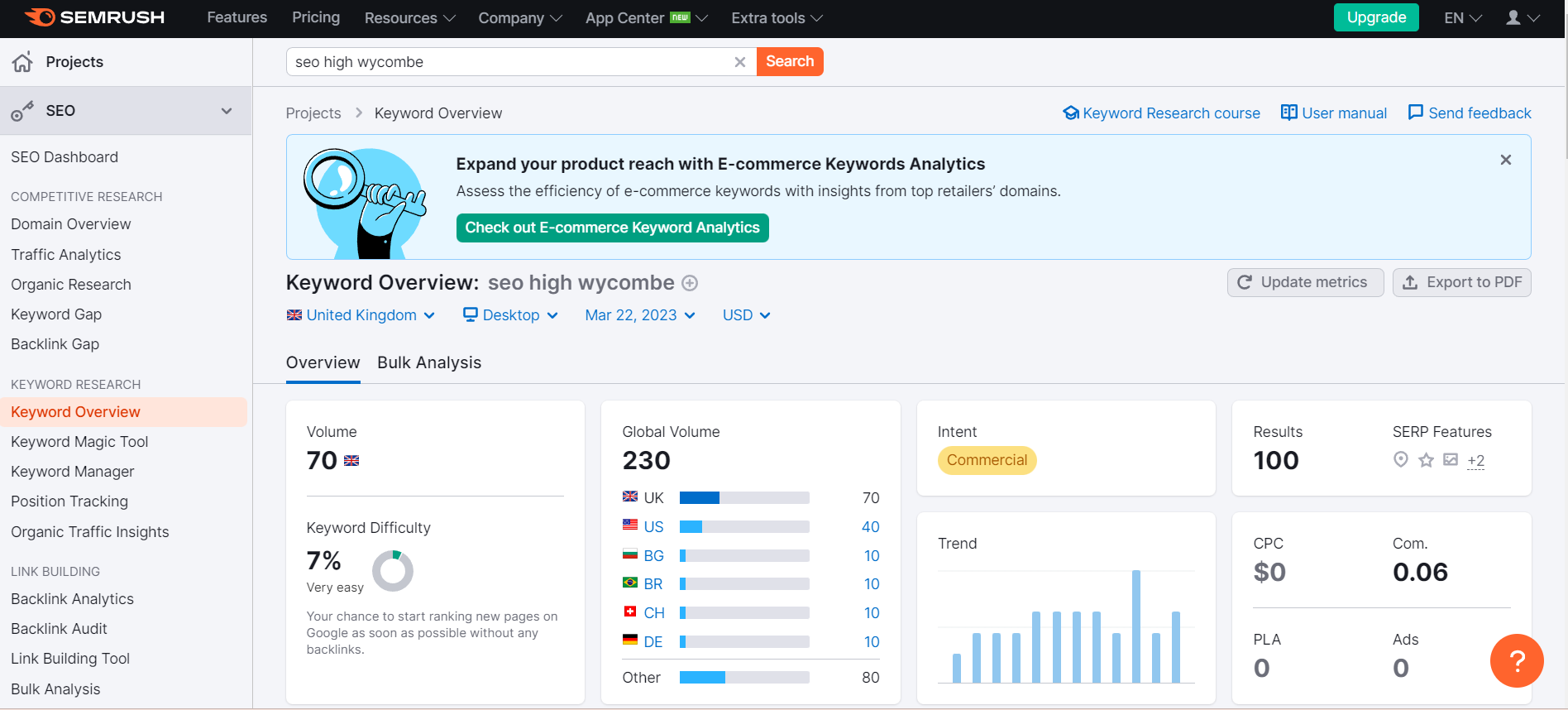What is ecommerce SEO
Ecommerce SEO is a process that helps online stores get more free traffic from search engines like Google, Bing, and Yahoo. When people search for something on Google, they see a page with ten organic results (free listings) and paid and shopping ads. Ecommerce SEO ensures your product pages appear among those ten organic results. The higher your ranking, the more traffic you’ll get and the more sales and revenue you can generate.

Some people believe that SEO is optional for ecommerce businesses and that Google will naturally bring in new traffic. But this is not true. If your competitors optimise their websites and you’re not, they will take all your traffic and customers. Ignoring SEO efforts can put your business in danger.
Research shows that the top result in Google’s organic search results gets a click-through rate of 27.6%. The first result is ten times more likely to get clicked than the tenth result, and only a few people go beyond the first page of search results. In short, you’re losing money without taking ecommerce SEO seriously.
Importance of ecommerce SEO
As an e-commerce business owner, you’re probably interested in attracting more customers to your website. Having more (and better quality) traffic often translates into more sales. The best way to attract high-quality leads to your site is through SEO. According to advertising experts, SEO provides the highest ROI of any marketing tactic and its results last longer.
However, many online sellers must pay more attention to SEO and have a strategy. If you’re one of those sellers who need to pay attention to the value of SEO for your online store, this guide is for you. We’ll explain ecommerce SEO, why it’s essential for success, and how to get started.

Ecommerce SEO strategy
To improve your ecommerce website’s search engine ranking, you need to learn the fundamental concepts of SEO and ensure you’re doing everything possible to optimise it. The most effective SEO strategy for ecommerce includes the following:
Keyword research for ecommerce SEO
If you run an online store, keyword research is vital for your SEO strategy. This research will help you understand what words and phrases people use to do google searches and find your website. You can use this information to optimise your content and products for the keywords that Google ranks.
When doing keyword research for e-commerce, there are several things to consider. First, you want to target keywords with high search volumes but remember that high search volume can also mean high competition. You can use a tool like Semrush to determine search volume.
Keyword difficulty is another factor to consider, as it estimates how difficult it is to rank for a particular keyword. If your website is new, starting with lower-difficulty keywords is best.
Search relevance is also significant because it measures how closely the search query matches the search results. You will only get conversions if the search results match your page content.
To perform keyword research for e-commerce, you can use tools like Semrush Rank Tracker or Google Search Console to monitor your site’s performance and set benchmarks. Search intent is also necessary because it helps you prioritise relevance and intent over keyword placement and backlinks. Google identifies four types of search intent: informational, commercial, transactional, and navigational.

In summary, ecommerce keyword research is critical to your SEO strategy. Using the right tools and considering search volume, keyword difficulty, and search relevance, you can optimise your content and products for the keywords that Google ranks. Additionally, search intent is crucial for attracting the right target audience.
Site Architecture for Ecommerce Websites
A simple and scalable website architecture is vital for a successful eCommerce website. If your website structure is simple, it makes it easier for users to navigate around your site and also helps with search engine rankings. Search engines use a website’s structure to find and rank pages, so having a well-structured site can help.

Your website’s architecture is a significant factor in ranking well in search engines. To ensure your product pages are easy to find, it’s best to ensure they’re at most three clicks away from your homepage. A well-structured and easy-to-use eCommerce website will make it easier for people to find what they’re looking for and have a better experience on your site.
Since most people access websites on their mobile devices, having a mobile-friendly website is vital. A menu that works well on mobile devices is essential since mobile screens are smaller.
A breadcrumb menu helps visitors move around your site and find what they want. Creating a user sitemap page that shows all your internal links in one place is also helpful for people using your site.
Having good website architecture is vital for a successful eCommerce website. By designing your site to be simple and scalable, you’ll make it easier for search engines to find and rank your pages and make it easier for people to use your site.
On-Page SEO for Ecommerce Sites
On-page optimisation for ecommerce SEO means doing things on a website to improve its ranking in search engines without depending on external factors. This is an essential first step for successful ecommerce SEO. To do this, several steps are involved, such as researching the right keywords and competitors. Once a strategy is made, there are four critical things to focus on for on-page SEO:

- Meta Title tags: These briefly describe what a webpage is about and help users decide if they want to visit the page. Keep title tags short (around 55-60 characters), so search engines can display them correctly.
- URLs: These should clearly explain the page’s purpose to search engines and show where it is on the website. The more a URL matches a user’s search, the higher it’s rank.
- Image Alt Text: This explains what an image is about because search engines can’t see pictures. The better the alt text, the more helpful the image will be to users.
- High-Quality Content: This is the most critical aspect of a website. Good content is unique and focused on one topic. It should also be valuable, informative, entertaining, or beneficial to the reader.
Ecommerce technical SEO
Technical SEO involves optimising your website specifically for search engines to make it easy for them to understand and interpret your site. It is essential to the SEO services package and eCommerce SEO strategy. Technical SEO for eCommerce websites is crucial because it helps search engines recognise the importance of your site and prompts them to rank it higher. The primary objective of technical SEO is to optimise the architecture of a website.
Here are some tips to improve the Technical SEO of your eCommerce website:
- Conduct an SEO Audit: It is vital to identify opportunities for improvement through an SEO audit, which helps ensure that any new SEO practices are built upon a strong foundation. Specialised auditing software like ahref is an excellent tool for this purpose. Digital Website Design provides clients with a free technical SEO audit before developing and implementing digital marketing strategies.
- Check Your Website Structure: A well-structured website improves the user experience and makes it easier for search engines to crawl and index. Evaluate your website’s navigation hierarchy to improve Technical SEO. Map out your website pages in a hierarchy tree structure to ensure your website’s pages flow logically. Assess navigation menus, category pages and product pages, internal linking, and URL structures.
- Ensure Your URLs Are in Order: URLs must be addressed when an eCommerce site has thousands of products. Utilise a focus keyword, clarify their hierarchy, always use hyphens to separate words, and keep URLs as short as possible.
- Secure Your Website: Google prefers secure websites, which means having a site prefixed with HTTPS and not just HTTP. SSL certificates are a significant part of technical SEO for eCommerce because customers are more inclined to purchase off a secure site they trust.
- Improve Your Loading Speeds: A website’s loading speed impacts the user experience. The probability of users leaving your website increases with page load time from 1 to 3 seconds. Google has indicated that site speed is one of the signals used by its algorithms to rank pages.
- Work on a Mobile-Friendly Version of Your Site: Most digital media time is spent on smartphones. Many online purchases are made through mobile. Google has switched to a mobile-first index, meaning that the mobile version of your eCommerce site is the baseline for indexing and determining SERP ranks.
- Optimised Keywords Are Beneficial for Technical SEO: Select keywords based on search results, volume, relevance, competition, and intent. Consider long-tail keywords that contain more than one word to improve search rankings.
- Link-Building: Backlinks from credible sources can boost your website’s search engine rankings. Reach out to authoritative blogs and industry experts to link to your website.
In conclusion, Technical SEO is essential for improving the search engine rankings of your eCommerce website. Following the tips above, you can improve your website’s architecture, loading speeds, user experience, and search engine rankings.

Ecommerce link building
Link building is a crucial aspect of SEO, contributing to over 50% of SEO success. It involves getting external websites to link to your site and passing on authority, relevance, and trust. In this article, we’ll discuss link building for eCommerce websites.
Authority is a critical factor in SEO, and it comes in three types, domain, page, and link authority. The relevancy of links is another important factor, and it refers to links to topically related pages. The third factor is trust, which refers to how much search engines trust your domain. Trust is built over time by sticking to Google’s guidelines and getting links from trustworthy websites.
Other important factors include link origin, link target, anchor text, and the nofollow attribute. The link origin is where the link is placed, while the link target is the page linked to. Ideally, they should share the same topic. The clickable part of the anchor text should contain keywords you want to rank for but should not overdo it as too many links with exact match anchor text may lead to a penalty. The nofollow attribute indicates that the link was paid for or that you don’t want to be associated with the site.
A natural link profile is essential for your site. You can analyse your competitors’ link profiles to understand what’s expected in your industry. As an eCommerce website, you must step outside your comfort zone and ask people to link to your site. Here are some tactics for link-building:
- Write unique, shareable content.
- Utilise broken link building by finding broken links on other sites and offering yours as a replacement.
- Use resource pages to find link opportunities.
- Participate in HARO (Help A Reporter Out) by answering journalists’ inquiries and getting links in return.
- Build relationships with influencers and bloggers in your industry.
- Offer discounts and promotions to customers who link to your site.
- Write guest posts on other sites and link back to yours.
- Use infographics and shareable content to get links.
- Create linkable assets like calculators, quizzes, and interactive tools.
Content marketing for ecommerce SEO
Content marketing is an effective way to attract potential customers and generate leads in the ecommerce industry. Whether you sell electronics or handmade products, content marketing can increase brand recognition and improve your online presence.
So, what exactly is content marketing, and how can it benefit your ecommerce business? Content marketing involves creating high-quality content that interests and engages your target audience. Instead of trying to sell your products or services, you provide valuable information that entertains or informs your readers.
You can build trust with potential customers and keep them engaged by consistently delivering helpful content. This can increase social media sharing and help you attract and convert more leads into loyal customers. You can educate potential customers and turn them into informed buyers by answering questions and providing informative how-to videos.
You can also establish yourself as an authority in your industry by publishing content related to trends and topics in your field. This helps to establish trust with your customers and can drive traffic to your ecommerce site. Additionally, using keywords in your content can help you achieve top results in search engine rankings.
In summary, content marketing is a perfect fit for ecommerce and can provide numerous benefits to your business. By implementing an effective content marketing strategy, you can increase revenue, improve your online presence, build trust, and establish yourself as an industry authority.
Local SEO for ecommerce businesses
Optimising your website’s local SEO is vital to improving your financial success if you have an e-commerce business with a physical location, cater to a specific area, or offer home services. By making your website provide relevant local and geographical information, you can attract more customers and increase sales.
Connecting with local customers is essential to improve sales, primarily if you operate a business that requires in-person interaction. With local SEO strategies, you can appear at the top of customer search results, gain third-party reviews, receive more backlinks from trusted sites like Facebook and Instagram, improve your search ranking based on proximity-based data, and provide easy accessibility to your business information, such as hours, phone number, and address.
Optimising your e-commerce local SEO strategy can bring huge benefits and make your business more accessible to local customers. You can determine your website’s ranking using various methods, including location and proximity-based data and total engagement on sites like Google and Facebook.
To optimise your e-commerce local SEO strategy, you can optimise your value propositions and naming, add a site map, use optimal SEO keywords for your products and descriptions, complete SEO fields for your product pages, connect with Google Webmasters and ‘My Business’ listing, add local keywords, and include area-specific content.
Incorporating local SEO into your e-commerce business is crucial for improving sales and engagement with local customers. By following the above tips to optimise your local e-commerce SEO strategy, you can increase your website’s visibility in search results and connect with more customers.
Measuring ecommerce SEO success
If you have an e-commerce website, measuring its search engine optimisation (SEO) performance is an essential task that must be done. However, SEO is a long-term strategy and can take several months before you can start seeing results. Key indicators of progress along the way can be used to demonstrate that SEO progress is being made and show the value it brings to your business.
Choosing the right SEO metrics to measure is essential, which can vary from company to company. In ecommerce, the focus is on metrics that directly relate to sales and revenue. In this article, we will discuss seven essential KPIs to benchmark and track to measure organic performance, prove value and use to evolve your ecommerce SEO strategy moving forward.
Organic website transactions and revenue
Organic website transactions and revenue are the metrics your stakeholders will most likely be interested in. You can use Google Analytics to view organic traffic and results separately from traffic from other sources. It is essential to review these numbers in the context of different channels and weigh them against what you are spending on each to give an accurate ROI figure for SEO.
However, a transaction attributed to one particular channel is unlikely not to have involved other channels too. Website visitors may only sometimes convert on their first visit, so tracking and understanding how multiple channels play a role in conversions is vital.
Organic assisted conversions
The assisted conversions feature in Google Analytics is a valuable tool that helps you to identify the sales through your website that the organic channel played an essential role in. This data may be partially accurate, but it can provide a rough value to help you report to stakeholders the importance of your SEO efforts to the customer journey.
Organic bounce rate
Bounce rate can be a good measure of your SEO performance, especially for an ecommerce website. By comparing your organic traffic bounce rate to traffic from other channels, you can determine if the keywords you are ranking for bring the right traffic to the site.
Suppose your organic bounce rate is lower than it used to be or lower than some of the other channels. In that case, it can be a sign that your keyword targeting is excellently bringing relevant people to your site. Suppose your bounce rate increases over time as you bring in more organic visitors. This can be a sign that you need to review your keyword targeting to attract more people with buying intent.
Organic conversion rate
Having a low bounce rate for organic traffic on your ecommerce site is excellent in showing that your site is engaging your audience, but what about your conversion rate? Organic visitors may be landing on your site and viewing a few different pages before they leave, but are they converting into customers? Comparing your organic conversion rate with other channels can help determine if any areas need improvement.
Keyword rankings
Keyword rankings are still an important SEO metric, but it is essential to use them correctly. You should not focus on just one or two keywords. Instead, you should track relevant keywords and analyse how their rankings change. It is also essential to consider each keyword’s search volume and competition to ensure you are targeting the right ones.
Click-through rate (CTR)
The click-through rate (CTR) measures how many people click on your website’s link in search results. It is an important metric because it shows how well your website performs on search engine results pages (SERPs). A high CTR can indicate that your website’s title and description are well-written and attract the right traffic.
Pages per session
Pages per session measure how many pages visitors view during their visit to your website. A high page-per-session count indicates that.
The Benefits of Ecommerce SEO
In the world of e-commerce, SEO is one of the most critical aspects of marketing your brand. It offers numerous benefits that can help improve your online presence and increase sales. First and foremost, SEO can help increase brand awareness and visibility. By ranking well for keywords related to your business, prospective customers are more likely to trust and recognise your brand.
SEO can also drive traffic to your website at all marketing funnel stages. Creating targeted content can attract visitors at the top, middle, and bottom of the funnel. This can help increase brand awareness and conversions. In addition, SEO can help expand remarketing audiences by placing cookies on your website and gathering shopper data. This enables you to create larger remarketing audiences, and better prepare your target audience for conversion.
Another vital benefit of e-commerce SEO is that it enhances page speed and the user experience. By ensuring that your website is fast, up-to-date, and easy to navigate, you can increase your website’s value for Google users and rank higher in search results.
Ranking high in search results also means a higher click-through rate (CTR). Web pages that rank on the first page of Google receive significantly more clicks than those that appear on the second page or lower. In addition, SEO can complement paid search efforts, leading to lower PPC costs and increased website visits.
Lastly, SEO is a long-term investment in your brand’s growth. While it may take longer to see results than a paid search campaign, the benefits of SEO can last long after the campaign is over. Overall, e-commerce SEO is essential for building your brand’s online presence and increasing sales.
SEO vs PPC for Ecommerce
If you have an ecommerce store and are deciding between SEO or PPC advertising, start with SEO and then move to paid advertising once you have enough money.
SEO is a strategy that can help improve your website’s organic search results, making it easier for potential customers to find you. Using relevant keywords and developing a solid marketing message can increase your brand visibility and convert visitors into buyers. While free tools are available to improve your SEO efforts, hiring a professional Ecommerce SEO company may be necessary to get the best results.
Some advantages of SEO include 24/7 availability, cost-effectiveness, and the potential for long-term results. However, it can take a few months to see results and requires adapting to changes in Google’s algorithm.
On the other hand, PPC advertising targets customers already looking for products like yours. You can adjust your spending to reach as many potential customers as possible and gather valuable data for future campaigns. However, PPC requires a financial investment. Poor performance can occur for various reasons, such as ad blockers or banner blindness.
Overall, both SEO and PPC have advantages and disadvantages, and it’s essential to consider your business’s needs and budget before deciding which strategy to use.
Get started with ecommerce SEO
Do you need help developing an effective SEO strategy for your ecommerce website? Implementing SEO for ecommerce sites is a crucial strategy for boosting the traffic to your website and turning it into revenue. If you are looking for assistance in launching your ecommerce SEO strategy, we are here to help.
As a highly reputable agency, we specialise in creating SEO campaigns that produce measurable results. You can trust us to provide an SEO campaign to enhance your online presence and help you succeed in the digital landscape.
Are you ready to drive more revenue for your ecommerce business? Get in touch to learn more about how our ecommerce SEO services can contribute to your success.
